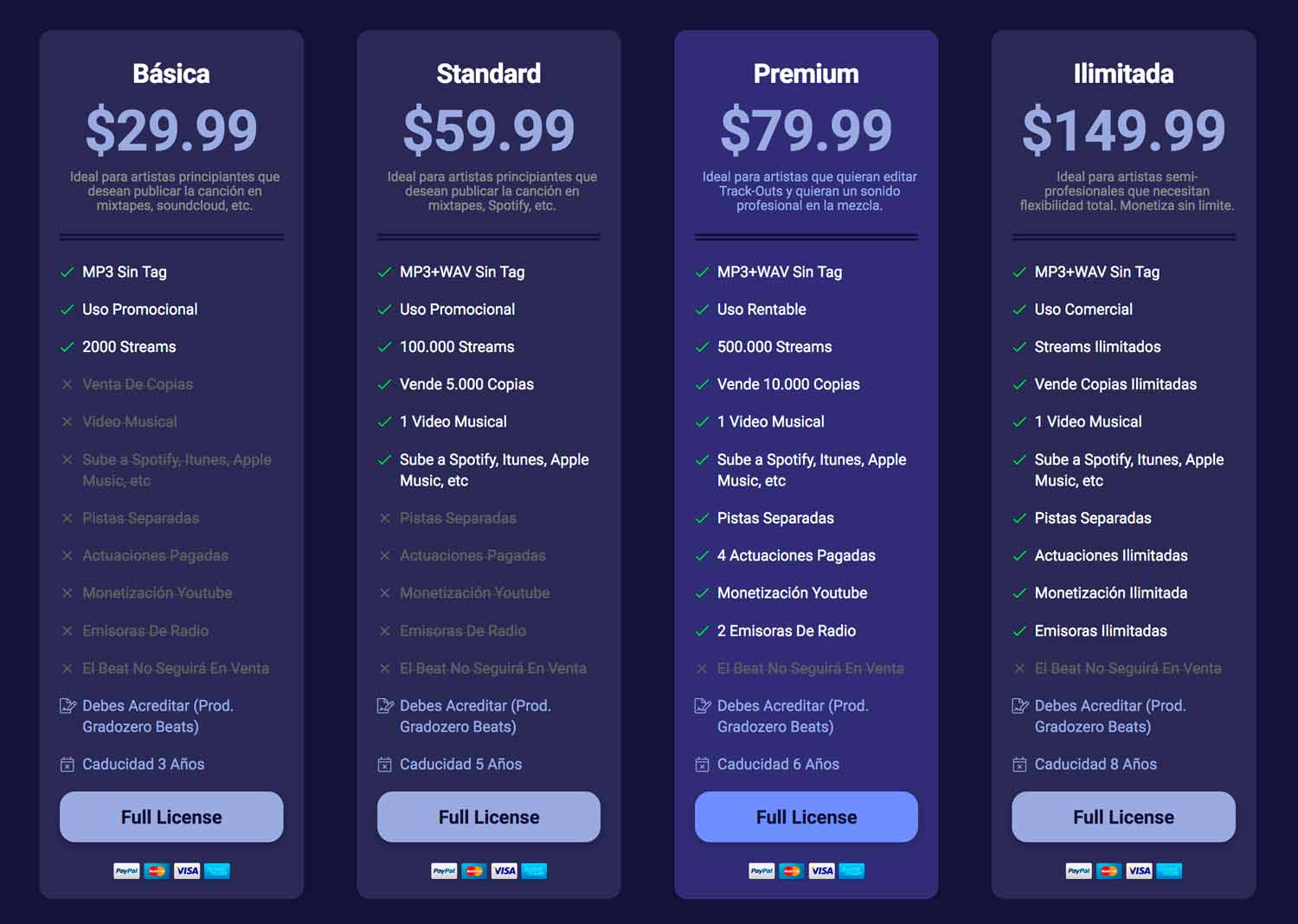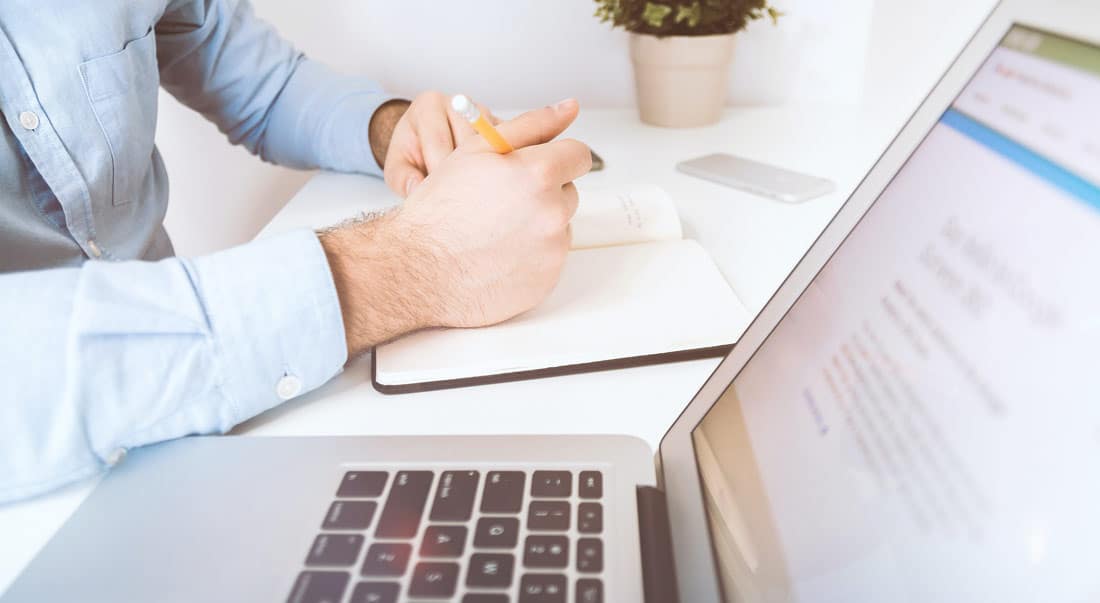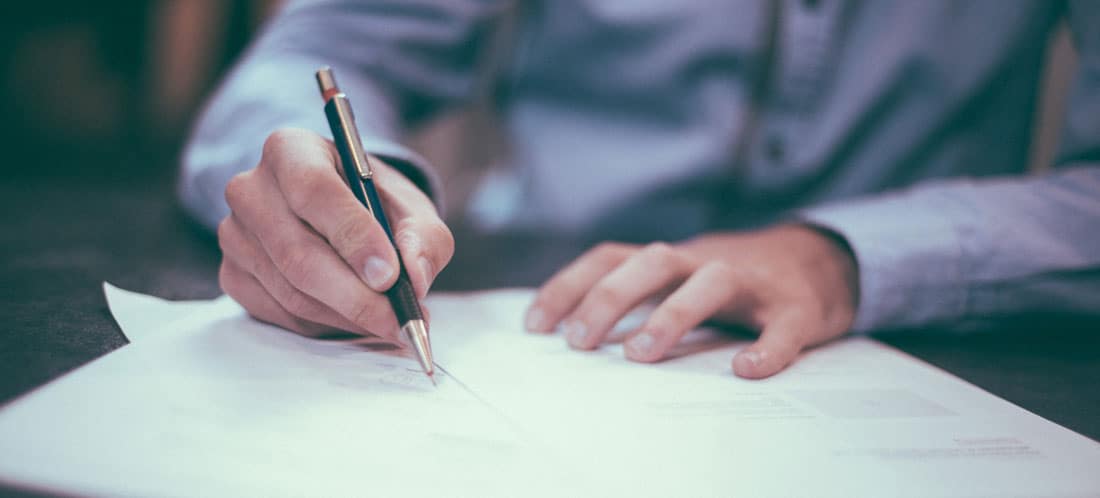Guide to know beats licenses
I still remember when I sold my instrumentals by Myspace or Soundclick, it was a novelty. Nowadays the way of selling instrumentals has changed a lot, in fact, it was never so easy to set up a Beats store. Something that has changed is that now beats are sold as licenses and that entails an internal operation that I want to show you. Below you will know the limitations and differences between licenses, all about royalties, copyrights, publishing rights and to finish I will answer some of the most frequently asked questions on this topic.
Description of the licenses:
When a producer uploads a new Beat to their online store, any artist can buy that Beat and download it directly. For the purchase of the beat the producer gives the artist a license to use with which the artist has a series of user rights to create and distribute the song. That license agreement is the legal proof that the producer has given a permission to the artist to use the Beat. Therefore, when an artist downloads a free Beat (even if it is sent by the producer) or records a sample of a Beat to use it, if he does not have a license he will never be able to use that song since the Beats are protected with Content id and without Legal agreement loses all validity.
Non-exclusive License
It is the most common way to sell a beat today. Their prices vary between $ 30-150. You can get a non-exclusive license and upload your song to Itunes, Spotify … etc, as long as you have checked that you have permission with the license you have purchased. The good thing is that you do not have to ask anything, just go to the producer’s website, inform yourself, buy the beat directly and receive the beat untagged with the user license immediately. Non-exclusive licenses have limitations on streams, visualizations, uses on platforms, etc. For example 10,000 streams on Spotify or 100,000 views on YouTube (in case you buy beats at gradozerobeats.com you will have no limits since all our licenses are unlimited). In addition, non-exclusive licenses have an expiration date, which is usually 2 to 8 years (in our case, our beats do not have an expiration date). Although it is still available, you can always renew it, either to another type of license that suits your current needs or for a longer time. The types of license depend on each producer, in my case I offer Basic, Standard, Premium and Unlimited licenses … being the most expensive one that offers you the most rights, although my best selling license is the Premium, since it offers the highest quality of audio and also the trackout of the beat by tracks. Artists who see these rights very limited, can always go for the Unlimited or for the exclusive. Here you can see the differences:

A beat can be sold to many different artists with this type of non-exclusive licenses … Whether it is a problem or not, it depends on how the artist is. For example, if you are a beginner artist you do not need an exclusive beat, but if you are a signed artist or about to blow up, then it is more worthwhile to get Exclusive Licenses.
When you acquire an exclusive license, there is no restriction of use rights, you can also use the beat in different projects, exploiting the beat to the fullest. When you buy an exclusive beat, you are the last person to take that beat … maybe the beat has already been sold in the form of a license before. People who previously purchased the beat can continue using it without problem, since they have their license legal use. In the exclusive contract there is a section that informs about it. There are two ways to sell exclusive rights and they are the sale of exclusive rights and the sale of exclusive property. The difference is that by selling the exclusive rights the producer is still the author of the music and can continue collecting writers share and publishing rights while at selling the exclusive property, the producer sells the Beat along with all interests, authorship, copyright etc. Therefore, the logical thing is not to sell the exclusive property so that both the artist and the producer are accredited for their work: legally, financially and commercially.
Everything you need to know about royalties, copyrights and publishing rights
This part is one of the most complicated to understand, mainly because in the music industry there are many different treatment structures, but the idea is that after reading all this you can understand it easily, so let’s start:
There are 2 types of royalties:
1. Mechanical royalties are generated when music is distributed physically or digitally. Printed, digital sales (Itunes) or transmissions, eg Spotify.
2. Performance royalties, for example when the song is played live or on the radio.

In most cases the artist keeps 100% of the mechanical royalties, whether the license he has acquired is exclusive or non-exclusive. Today services such as Cdbaby, Tunecore or Distrokid pay those royalties directly to the artist, if he is an independent artist. When the artist is in a record label, those royalties are paid to it and the record label pays a percentage to the artist.
In many cases the artist keeps 100% of the mechanical rights, but not always. There is an exception to this that applies to exclusive rights. Some producers request between 1 and 10% for mechanical royalties in exclusive agreements. This is known as producer points or royalties. In this scenario, the price that an artist pays for exclusive rights is considered an advance against mechanical royalties, which may be required in the future. It is calculated over the net profit of the song, which means that all the costs to create the song, including the exclusive price, can be deducted first before the producer gets his share.
For example:
-The artist pays $ 1,000 (exclusive beat) + $ 500 (studio time) + $ 500 (mixing and mastering) = $ 2,000
-After one year, the song generates $ 10,000 in mechanical royalties – $ 2,000 (investment) = $ 8,000
-The producer share is 3% of $ 8,000 = $ 240.
For an independent artist, $ 8,000 is a lot of money to generate in royalties, but still, it’s only $ 240 that the producer earns. For this reason many producers prefer to sell exclusive rights with an advance against royalties, since, in the best times it was very easy to sell exclusive beats for more than $ 3,000 but today there is a lot of competition and the price has dropped a lot. Think that if the song ends up being a hit and the beat sells for less than $ 1000 generating a lot of money in royalties, it would not be fair to the producer (creator of half of the song), so this advance against royalties is the solution . The artist only has to worry about paying that 3% and in turn it is an insurance for the producer who sells his exclusive beat for little money.
Who collects performance royalties?
Performance royalties are collected and paid by implementing rights organizations (PRO) such as ASCAP or BMI in the USA or SGAE in Spain. Each country has its own organization, check which one is yours. These royalties are divided into two parts, royalties from the composer or Share of the writer, and editorial royalties. The PRO collect these royalties and divide them into 2 groups. For every $ 1 earned in performance royalties, 0.50 goes to composer royalties (this money is paid by the Pro directly to the artists) and the other 0.50 goes to royalty royalties (the PRO pays it directly to the company editorial or publication manager).
In copyright law, a producer is also considered a composer. Composer royalties apply to all people who have intervened creatively in the song, producers, composers and sometimes even engineers. In general, non-exclusive beat licenses are sold with 50% publication and participation of writers. This is not negotiable, since the musical part is half of the song and the other half is the lyrics. That half has to be distributed among the different artists who have written the lyrics.
Example in a non-exclusive license.
1. Producer = 50%.
2. Writer 1 = 25%.
3. Writer 2 = 25%.
Example in an exclusive license.
1. Producer = 30%.
2. Writer 1 = 35%.
3. Writer 2 = 35%.

What are editorial royalties?
Unlike the copyright of Songwriter, the publication can be assigned to external entities called publishing companies. It is likely that most independent artists and producers do not have an editorial agreement, which means that they will have to collect the royalties themselves. Surprisingly, here there is a lot of money left on the table. If you are an independent artist or producer who is only registered with a PRO and not with a Publication Manager, half of what you have earned is still waiting for you to pick it up. Songtrust can help you collect these royalties if you are an independent artist. In terms of online licenses, whether exclusive or not, the percentage of publishing rights is generally equivalent to the participation of writers. 50% of the participation of writers is equivalent to 50% of the publication.
Copyright
When you release a song and distribute it through CDBaby, TuneCore or DistroKid. This song contains two copyright elements. The music, of which the producer owns the copyright, and the lyrics, of which you own the copyright. Whether you have purchased an exclusive license or not, the producer will always be the copyright owner of the music and the artist will always be the copyright owner of the lyrics unless the lyrics are written by another person for the artist. This is what we call the performing arts copyright (PA-Copyright).
Sound Recording Copyright (SR-Copyright)
When you create a song with a producer, this is known as Master or sound recording. This is where the difference between an exclusive or non-exclusive license plays an important role since if you have the exclusive license of a beat, you own the recording, sound and master rights but if you have a non-exclusive license, you do not own the main recording rights, and sound. In an exclusive license, the master rights will be transferred to the artist and will become his exclusive property, without any claim from the Producer. The only exception here is the producer’s right to jointly claim the copyright of the so-called “underlying musical composition”. This is what we referred to earlier as PA-Copyright. The producer is and always will be the original creator of the music.
With a non-exclusive license, the client does not own the rights to record sound or master in the song. He has been granted the right to use the rhythm and commercially exploit the song according to the terms and conditions of the non-exclusive agreement. Therefore, you only own the PA copyright of the letters. Instead, what they have created is called Derivative Work, which is a combination of an original copyrighted work (the beat) along with the artist’s original work (the lyrics). Eg remixes, a Spanish version of an English song, etc. The so-called new versions created with a pre-existing copyrighted material.
In terms of licenses, a non-exclusive agreement authorizes an artist to create the “new version”, using the copyrighted material of the producers. The only person who can authorize a derivative work is the owner of the underlying composition. In this case, the producer. When someone grants a non-exclusive license, they are specifically granted the right to create a derivative work.
Frequent questions:
What is better for me? Exclusive or non-exclusive beat?
Here I leave a link where I explain everything about it
What happens if the Beat contains third-party samples?
If a producer creates a Beat with third-party samples, he must have permission to use those samples.
What happens if I rent a rhythm today and the producer sells the exclusive rights tomorrow? How will that affect me?
Nothing, even if your license is not exclusive, you can continue using it while the contract is in force or has not reached the number of streams or limitations of that license. There is a clause in the exclusive contract that protects buyers from previous licenses.
Can I buy a beat that has already been sold exclusively by the producer?
No, there is a contract with the customer who bought the beat exclusively and if it did it would be a violation of the exclusive contract.
What happens when I rent a rhythm and the song I made with it explodes?
In that case, the most advisable thing is to acquire the exclusive license of that Beat to get the most out of it.
What about other people who got the license of that same rhythm?
Absolutely nothing, they can continue using their licenses until they have exhausted their sales limit or until the contract expires. Non-exclusive licenses are limited to a certain amount of user rights and are only valid for several years.
I did a HIT and the license I bought is reaching the limit of allowed streams, but I can’t renew it because it has been sold exclusively. What should I do?
If your license is about to expire or has reached an allowed limit, I’m sorry but legally you have to remove the song from any platform. With our beats you can forget about those problems since all the licenses are unlimited licenses in terms of streams and copies and also do not have an expiration date, which can save you a lot of stress for the same money.
They ask me if I can do a Beat similar to another one that I already sold:
You can do something similar, with similar instruments and structure, but with different chords and nothing to use parts of the beat already sold.
I have created a beat with another producer, how do we divide the publication and composition of the composers?
Sales, publication and participation of the composer are usually divided at 50/50. When the rhythm is sold or licensed to an artist, 50% of the publications are normally granted to the artist, and the writers share the song they make. So in this case it would be something like this: Artist = 50% | Producer 1 = 25% | Producer 2 = 25%
If someone releases a song with a beat of mine but does not have a user license, what do I do?
As a producer, the first thing you can do is contact the artist and inform him about the improper use of the beat and offer them to buy a user license or to remove the song from any platform where it is published.
If they pay attention to you, perfect. But what if they don’t? In this case you can do nothing (If the song does not earn many visits and is poor … it is not worth wasting time and money) or make a DMCA demolition, which is to remove a content from a website at the request of the content owner or of the copyright of the content. As a producer, you have the right to process a removal notice to any artist who uses a beat of yours without a user license. (More information here: https://www.dmca.com)

